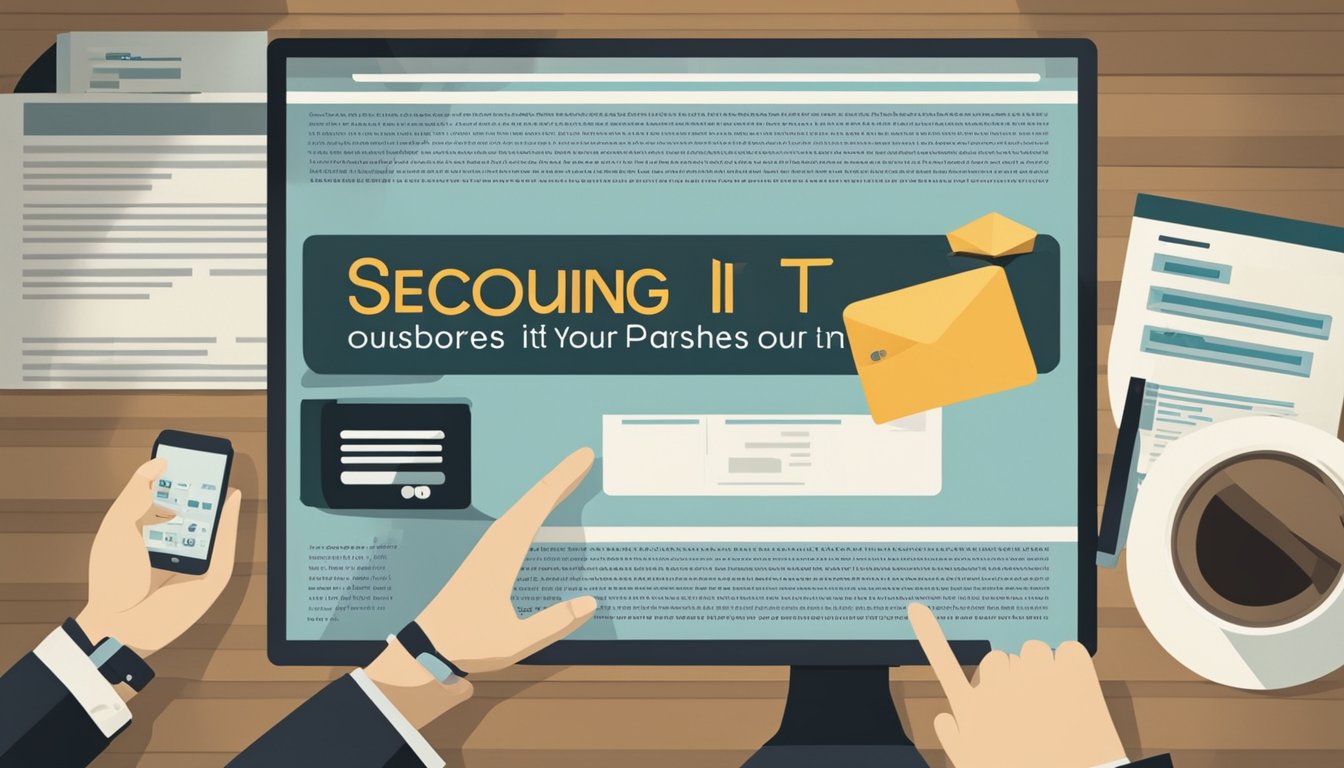Choosing the Right IT Outsourcing Partner for Your Business A Clear Guide
When it comes to running a successful business, having the right IT outsourcing partner can make all the difference. Selecting an outsourcing partner can be a daunting task, but with the right approach, it can be a smooth and beneficial process. In this article, I will guide you through the key steps to choose the right IT outsourcing partner for your business needs.

The first step in selecting an outsourcing partner is to understand your outsourcing needs. You need to determine what IT services you need and what you expect from your outsourcing partner. This will help you identify the right outsourcing model and evaluate potential partners based on their ability to meet your specific needs. Once you have a clear understanding of your outsourcing needs, you can move on to evaluating potential IT outsourcing partners.
Evaluating potential IT outsourcing partners requires a thorough vetting process. You need to consider factors such as the vendor's experience, expertise, and reputation. Additionally, you need to ensure that the vendor's communication style and work culture align with your business values. Finally, you need to secure your business interests by signing a comprehensive contract that outlines the terms and conditions of the partnership. By following these steps, you can select an outsourcing partner that is compatible with your business needs and goals.
Key Takeaways
- Understanding your IT outsourcing needs is crucial to selecting the right partner.
- Evaluating potential outsourcing partners requires a thorough vetting process.
- Securing your business interests through a comprehensive contract is essential for a successful partnership.
Understanding Your IT Outsourcing Needs

As a business owner, it is essential to understand your IT outsourcing needs before selecting an outsourcing partner. Identifying your core business goals and the scope of work that needs to be outsourced is crucial in determining the right outsourcing model for your business.
Before outsourcing, you need to evaluate your business processes to identify areas that need improvement. This evaluation will help you determine which IT functions to outsource and which to keep in-house.
It's also important to consider your deadlines and the level of urgency for each outsourced task. This will help you choose an outsourcing partner that can deliver results within your desired timeframe.
When considering outsourcing models, it's important to understand the different IT outsourcing models available. You can choose from staff augmentation, project-based outsourcing, managed services, and more. Each model has its pros and cons, and it's essential to select the one that aligns with your business goals and IT needs.
Moreover, digital transformation is a crucial aspect of outsourcing IT functions. You should select an outsourcing partner that can help you achieve your digital transformation goals. They should have the expertise to implement the latest technologies and tools that can help streamline your business processes and improve efficiency.
In summary, understanding your IT outsourcing needs is the first step in selecting the right outsourcing partner. By evaluating your business processes, deadlines, and outsourcing models, you can identify the right partner that can help you achieve your business goals and digital transformation objectives.
Evaluating Potential IT Outsourcing Partners

When evaluating potential IT outsourcing partners, it is important to consider various factors to ensure that you are selecting the right partner for your business needs. Here are some best practices for evaluating potential IT outsourcing partners:
Assessing Technical Expertise and Experience
One of the most important factors to consider when evaluating potential IT outsourcing partners is their technical expertise and experience. You should research the outsourcing provider's technology stack, expertise in software development, and experience in app development. It is also important to assess their proficiency in agile methodologies and their development team's specialized skills.
Examining Reputation and References
Another important factor to consider when evaluating potential IT outsourcing partners is their reputation and references. You should examine their market reputation by researching their case studies and testimonials. You should also check their reviews on websites like Clutch to see what their previous clients have to say about their services. Additionally, you can network with other businesses to get recommendations for outsourcing providers.
Considering Cost and Value
Cost is always a factor when considering outsourcing, but it is important to consider the value you will receive in return. You should look for an outsourcing provider that offers cost savings and cost-efficiency without compromising on quality. It is also important to consider the outsourcing provider's ability to provide long-term value to your business.
In conclusion, evaluating potential IT outsourcing partners requires research and consideration of various factors such as technical expertise, reputation, and cost. By following these best practices, you can select the right outsourcing provider for your business needs.
Ensuring Compatibility and Communication

When choosing an IT outsourcing partner, it's important to ensure that the provider is compatible with your company culture and values. This can help to ensure a smooth collaboration and minimize any potential conflicts that may arise.
Cultural and Organizational Fit
One key factor to consider when evaluating compatibility is cultural fit. This involves assessing the compatibility of the outsourcing provider's company culture with your own. It's important to ensure that the outsourcing provider shares your values and priorities, as this can help to ensure that they will be able to understand and meet your needs effectively.
Another important consideration is organizational fit. This involves assessing the compatibility of the outsourcing provider's organizational structure with your own. It's important to ensure that the outsourcing provider has the necessary resources and capabilities to meet your needs effectively, and that their processes and workflows are compatible with your own.
Effective Communication Practices
Effective communication is essential for any successful outsourcing collaboration. When evaluating potential outsourcing partners, it's important to assess their communication practices and ensure that they are able to communicate effectively with your team.
One potential challenge to effective communication is the language barrier. If your outsourcing partner is located in a different country, it's important to ensure that they have a strong command of the language used in your business operations. This can help to ensure that communication is clear and effective, and that there are no misunderstandings or miscommunications.
Another important consideration is feedback. It's important to establish clear channels for feedback and ensure that your outsourcing partner is receptive to feedback and willing to make changes based on your input. This can help to ensure that the collaboration is productive and that the outsourcing provider is able to meet your needs effectively.
In conclusion, when choosing an IT outsourcing partner, it's important to ensure compatibility with your company culture and values, and to establish effective communication practices to ensure a successful collaboration. By assessing these factors and choosing a provider that is compatible with your needs, you can help to ensure a successful outsourcing collaboration.
Securing Your Business Interests

When it comes to IT outsourcing, securing your business interests is of utmost importance. Here are two key factors to consider:
Data Security and Intellectual Property Protection
One of the biggest concerns businesses have when outsourcing is the security of their data and intellectual property. It is important to choose an IT outsourcing service provider that has a strong track record in data security and intellectual property protection. This can be achieved by reviewing the provider's portfolio and asking for references from previous clients.
To further ensure data security, outsourcing relationships should be based on a customized approach that takes into account the unique needs and expectations of the business. Technical proficiency is also important, as it ensures that the provider has the necessary expertise to implement security measures such as least privilege access and encryption.
Flexibility and Scalability
Another important factor to consider is flexibility and scalability. Outsourcing providers should be able to adapt to the changing needs of the business and provide staff augmentation as necessary. This allows for greater innovation and agility in the business, which is especially important for startups and SMBs.
Enterprises, on the other hand, require providers that can handle larger projects and provide a more structured approach to outsourcing. It is important to choose a provider that can scale up or down as needed and provide a range of services that can be tailored to the specific needs of the business.
In conclusion, choosing the right IT outsourcing partner requires careful consideration of resources, expectations, and business needs. By selecting a provider that has a strong track record in data security and intellectual property protection, and that can provide flexibility and scalability, businesses can ensure a successful outsourcing relationship.
Frequently Asked Questions

What are the key factors to consider when choosing an IT outsourcing partner?
When choosing an IT outsourcing partner, there are several key factors to consider. These include the outsourcing provider's experience and expertise, their ability to deliver high-quality services, their pricing model, their communication and collaboration skills, and their ability to provide ongoing support and maintenance.
What are the benefits of outsourcing IT services?
Outsourcing IT services can provide several benefits for businesses. These include cost savings, access to specialized expertise, increased flexibility and scalability, improved efficiency and productivity, and reduced risk and liability.
How do you evaluate the expertise and experience of an outsourcing partner?
To evaluate the expertise and experience of an outsourcing partner, you should review their portfolio of past projects and clients, assess their technical skills and knowledge, and ask for references and case studies. You can also look for industry certifications and awards, and evaluate their overall reputation and customer satisfaction ratings.
What are the risks associated with outsourcing IT services and how can they be mitigated?
The main risks associated with outsourcing IT services include security and data privacy concerns, language and cultural barriers, quality and performance issues, and potential communication breakdowns. These risks can be mitigated by choosing a reputable and experienced outsourcing provider, establishing clear communication channels and protocols, and implementing robust security and data protection measures.
What are the different pricing models used by IT outsourcing providers?
IT outsourcing providers typically use several different pricing models, including fixed-price contracts, time and materials contracts, and outcome-based contracts. Each model has its own advantages and disadvantages, and the best approach will depend on the specific needs and goals of your business.
How do you ensure effective communication and collaboration with an outsourcing partner?
To ensure effective communication and collaboration with an outsourcing partner, it is important to establish clear communication channels and protocols, set expectations and goals upfront, and maintain regular communication and feedback throughout the project. You should also consider using collaboration tools and technologies to facilitate real-time communication and collaboration, and establish clear roles and responsibilities for all team members.

We are committed to delivering a new level of automation that will help organizations save time, money, and staffing resources.
 WRITE FOR US!
WRITE FOR US!
